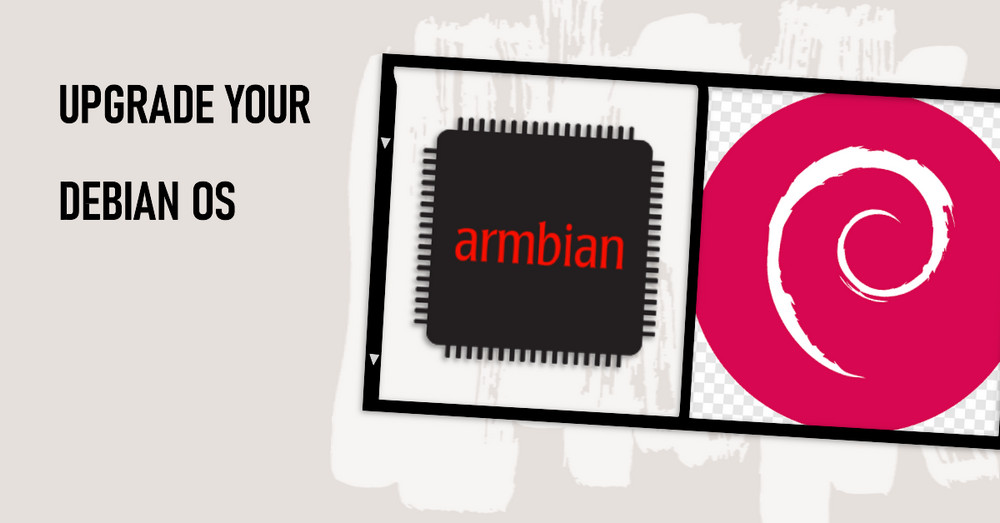Upgrade Debian from Buster to Bookworm
About
In this scenario, the device has an aarch64 chipset and is running Armbian, which is based on Debian.
It provides a step-by-step guide for upgrading from Debian 10 (Buster) to Debian 11 (Bullseye), and then to Debian 12 (Bookworm).
Upgrade from Buster to Bullseye
- Backup data.
This should always be the first step before making major system changes. You can use tools like rsync or tar to back up the data.
- Verify Current Debian Version
lsb_release -a- Update the current system.
Ensure the current system is fully up-to-date by running:
sudo apt update && sudo apt upgrade -y
sudo apt full-upgrade- Change the repositories.
Create a backup of current sources.list file by renaming it to sources.lists.bak
sudo mv /etc/apt/sources.list /etc/apt/sources.list.bakCreate a new one with the following contents:
sudo cat >> /etc/apt/sources.list << EOF
deb [arch=arm64,armhf] http://deb.debian.org/debian bullseye main contrib non-free
deb [arch=arm64,armhf] http://deb.debian.org/debian bullseye-updates main contrib non-free
deb [arch=arm64,armhf] http://deb.debian.org/debian bullseye-backports main contrib non-free
deb [arch=arm64,armhf] http://security.debian.org/ bullseye-security/updates main contrib non-free
EOFEdit /etc/apt/sources.list.d/* files to point to Bullseye instead of Buster.
sudo sed -i 's/buster/bullseye/g' /etc/apt/sources.list.d/*.list- Update the package list.
Run the following command to update the package list:
sudo apt updateHit:1 http://deb.debian.org/debian bullseye InRelease
Hit:2 http://deb.debian.org/debian bullseye-updates InRelease
Hit:3 http://deb.debian.org/debian bullseye-backports InRelease
Hit:4 http://security.debian.org bullseye-security/updates InRelease
Get:5 http://mirrors.sustech.edu.cn/armbian bullseye InRelease [53.3 kB]
Fetched 53.3 kB in 2s (24.6 kB/s)
Reading package lists... Done
Building dependency tree
Reading state information... Done
397 packages can be upgraded. Run 'apt list --upgradable' to see them.
- Perform a minimal system upgrade:
Upgrade all existing packages without installing or removing any additional packages with this command:
sudo apt upgrade --without-new-pkgsAfter this operation, several questions will be asked to confirm. Keep pressing the Enter key to continue. Below are some examples:
The default action is to keep your current version.
* issue.net (Y/I/N/O/D/Z) [default=N] ?
- Upgrade the packages.
Now you can upgrade all system's packages to Bullseye versions with:
sudo apt full-upgrade -y- Restart the system.
After the upgrade is complete, you should restart the system to ensure all changes are properly applied.
sudo reboot- Check the Debian version.
Once the system reboots, check the Debian version to confirm the upgrade:
lsb_release -aCongratulations on successfully upgrading to Debian 11 (Bullseye)!
- Clean unused packages:
Ensure a clean system by removing any packages that are no longer required.
sudo apt --purge autoremove -y
sudo find /etc -name '.dpkg-' -o -name '.ucf-' -o -name '*.merge-error'Upgrade from Bullseye to Bookworm
Follow the same steps as above
- Update current system.
Ensure current system is fully up-to-date by running:
sudo apt update && sudo apt upgrade -y
sudo apt full-upgrade -y- Change the repositories.
Replace 'bullseye' with 'bookworm' in /etc/apt/sources.list and /etc/apt/sources.list.d/* files via sed.
sudo sed -i 's/bullseye/bookworm/g' /etc/apt/sources.list
sudo sed -i 's/bullseye/bookworm/g' /etc/apt/sources.list.d/armbian.listAdditionally, add the "non-free-firmware" repository for hardware driver support.
sudo sed -i 's/non-free/non-free non-free-firmware/g' /etc/apt/sources.list
sudo sed -i 's/non-free/non-free non-free-firmware/g' /etc/apt/sources.list.d/*- Update the package list.
Run the following command to update the package list:
sudo apt update- Perform a minimal system upgrade:
Upgrade all existing packages without installing or removing any additional packages with this command:
sudo apt upgrade --without-new-pkgsAfter this operation, several questions will be asked to confirm. Keep pressing the Enter key to continue. Below are some examples:
The default action is to keep your current version.
* issue.net (Y/I/N/O/D/Z) [default=N] ?
- Upgrade the packages.
Now you can upgrade all system's packages to Bookworm versions with:
sudo apt full-upgrade -y- Restart the system.
After the upgrade is complete, you should restart the system to ensure all changes are properly applied.
sudo reboot- Check the Debian version.
Once the system reboots, check the Debian version to confirm the upgrade:
lsb_release -aCongratulations on successfully to Debian 12 (bookworm)!
- Clean unused packages:
Ensure a clean system by removing any packages that are no longer required.
sudo apt --purge autoremove -y
sudo find /etc -name '.dpkg-' -o -name '.ucf-' -o -name '*.merge-error'Resolving the Warning of Key Stored Issue on apt update
Issue:
When running apt update, a warning message may appear indicating that a key stored in /etc/apt/trusted.gpg is no longer valid.
Solution:
To resolve the issue, follow these steps:
List the available keys with the following command:
sudo apt-key listTake note of the last 8 digits of the public key that corresponds to the repository being updated.
Export the public key to a new file using the following command:
sudo apt-key export <last-8-digits-of-public-key> | gpg --dearmour -o /etc/apt/trusted.gpg.d/armbian.gpgThis will create a new trusted key file named
armbian.gpgin the/etc/apt/trusted.gpg.d/directory.Update the package lists to confirm that the key issue has been resolved:
sudo apt update
Conclusion
Upgrading from Debian 10 (Buster) to Debian 12 (Bookworm) provides a range of benefits such as new features and improvements, regular security updates, long-term support, and compatibility with newer software and hardware.




